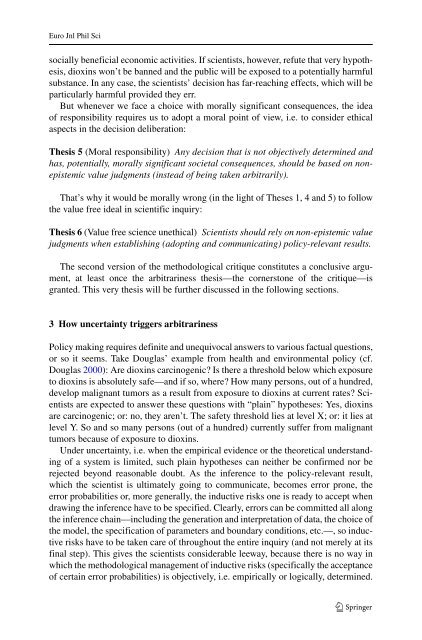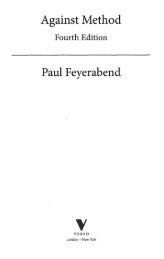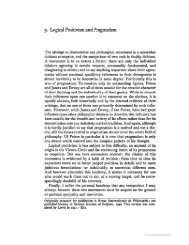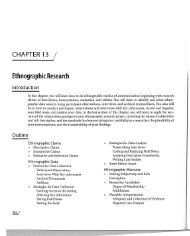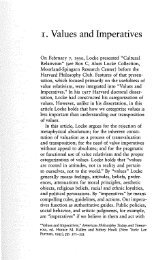In defence of the value free ideal
In defence of the value free ideal
In defence of the value free ideal
- No tags were found...
Create successful ePaper yourself
Turn your PDF publications into a flip-book with our unique Google optimized e-Paper software.
Euro Jnl Phil Scisocially beneficial economic activities. If scientists, however, refute that very hypo<strong>the</strong>sis,dioxins won’t be banned and <strong>the</strong> public will be exposed to a potentially harmfulsubstance. <strong>In</strong> any case, <strong>the</strong> scientists’ decision has far-reaching effects, which will beparticularly harmful provided <strong>the</strong>y err.But whenever we face a choice with morally significant consequences, <strong>the</strong> idea<strong>of</strong> responsibility requires us to adopt a moral point <strong>of</strong> view, i.e. to consider ethicalaspects in <strong>the</strong> decision deliberation:Thesis 5 (Moral responsibility) Any decision that is not objectively determined andhas, potentially, morally significant societal consequences, should be based on nonepistemic<strong>value</strong> judgments (instead <strong>of</strong> being taken arbitrarily).That’s why it would be morally wrong (in <strong>the</strong> light <strong>of</strong> Theses 1, 4 and 5) to follow<strong>the</strong> <strong>value</strong> <strong>free</strong> <strong>ideal</strong> in scientific inquiry:Thesis 6 (Value <strong>free</strong> science unethical) Scientists should rely on non-epistemic <strong>value</strong>judgments when establishing (adopting and communicating) policy-relevant results.The second version <strong>of</strong> <strong>the</strong> methodological critique constitutes a conclusive argument,at least once <strong>the</strong> arbitrariness <strong>the</strong>sis—<strong>the</strong> cornerstone <strong>of</strong> <strong>the</strong> critique—isgranted. This very <strong>the</strong>sis will be fur<strong>the</strong>r discussed in <strong>the</strong> following sections.3 How uncertainty triggers arbitrarinessPolicy making requires definite and unequivocal answers to various factual questions,or so it seems. Take Douglas’ example from health and environmental policy (cf.Douglas 2000): Are dioxins carcinogenic? Is <strong>the</strong>re a threshold below which exposureto dioxins is absolutely safe—and if so, where? How many persons, out <strong>of</strong> a hundred,develop malignant tumors as a result from exposure to dioxins at current rates? Scientistsare expected to answer <strong>the</strong>se questions with “plain” hypo<strong>the</strong>ses: Yes, dioxinsare carcinogenic; or: no, <strong>the</strong>y aren’t. The safety threshold lies at level X; or: it lies atlevel Y. So and so many persons (out <strong>of</strong> a hundred) currently suffer from malignanttumors because <strong>of</strong> exposure to dioxins.Under uncertainty, i.e. when <strong>the</strong> empirical evidence or <strong>the</strong> <strong>the</strong>oretical understanding<strong>of</strong> a system is limited, such plain hypo<strong>the</strong>ses can nei<strong>the</strong>r be confirmed nor berejected beyond reasonable doubt. As <strong>the</strong> inference to <strong>the</strong> policy-relevant result,which <strong>the</strong> scientist is ultimately going to communicate, becomes error prone, <strong>the</strong>error probabilities or, more generally, <strong>the</strong> inductive risks one is ready to accept whendrawing <strong>the</strong> inference have to be specified. Clearly, errors can be committed all along<strong>the</strong> inference chain—including <strong>the</strong> generation and interpretation <strong>of</strong> data, <strong>the</strong> choice <strong>of</strong><strong>the</strong> model, <strong>the</strong> specification <strong>of</strong> parameters and boundary conditions, etc.—, so inductiverisks have to be taken care <strong>of</strong> throughout <strong>the</strong> entire inquiry (and not merely at itsfinal step). This gives <strong>the</strong> scientists considerable leeway, because <strong>the</strong>re is no way inwhich <strong>the</strong> methodological management <strong>of</strong> inductive risks (specifically <strong>the</strong> acceptance<strong>of</strong> certain error probabilities) is objectively, i.e. empirically or logically, determined.


